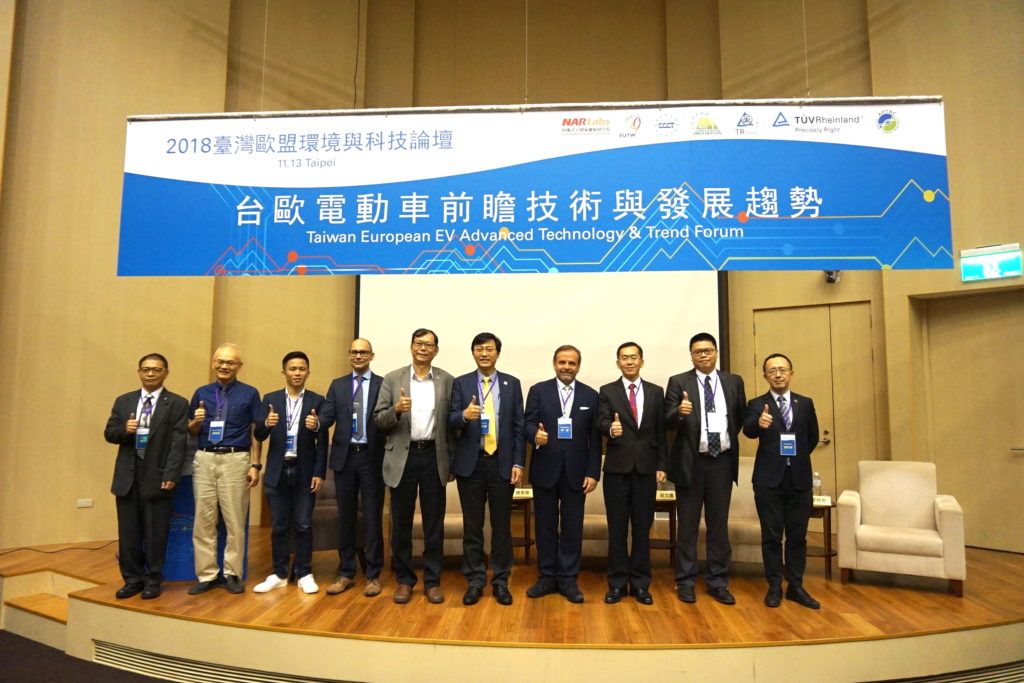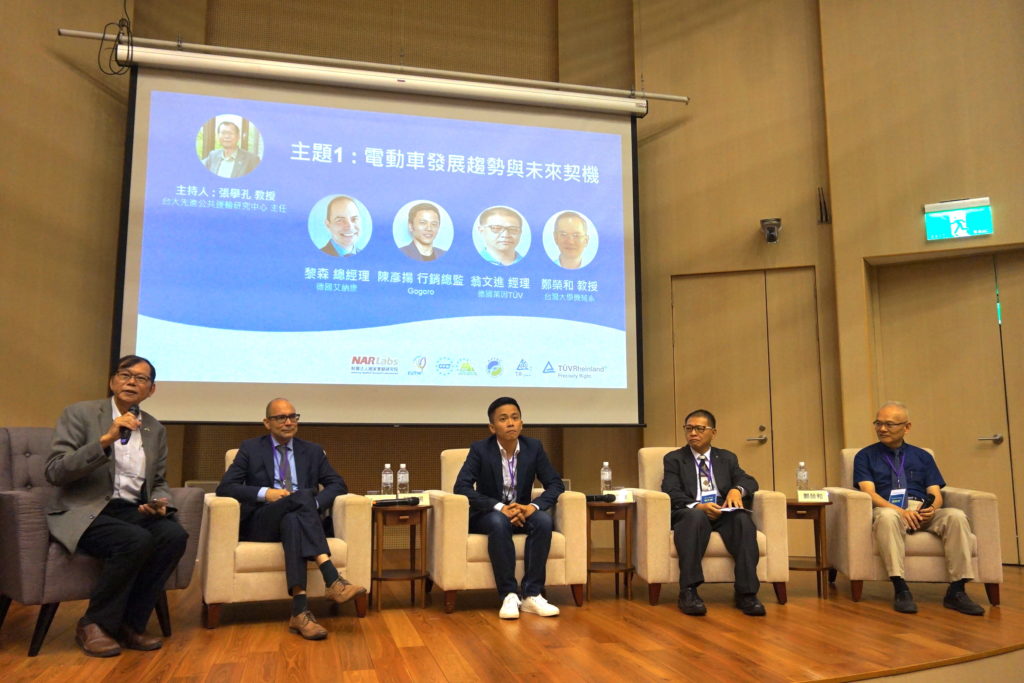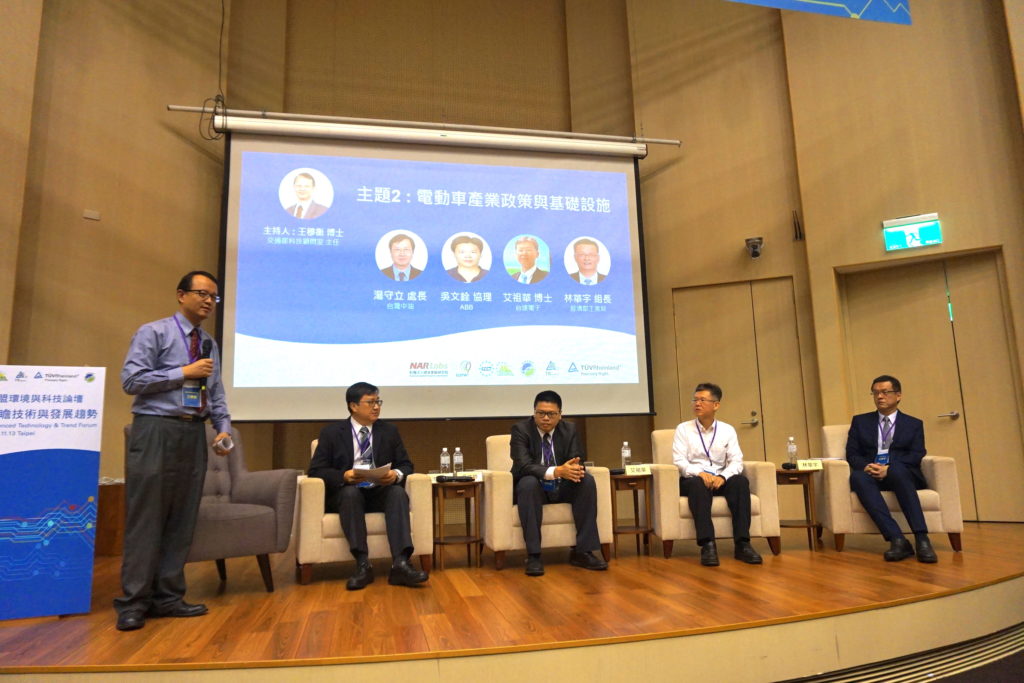Taiwan-Europe EV Advanced Technology & Trend Forum 台歐電動車前瞻技術與發展趨勢論壇

The forum was organised by the ECCT’s Low Carbon Initiative (LCI) together with the Advanced Public Transportation Research Center (APTRC), National Applied Research Laboratories (NAR Labs), the European Union Centre in Taiwan (EUTW) and TÜV Rheinland. At the event opening remarks were made by ECCT Vice Chairman Giuseppe Izzo and National Taiwan University (NTU) Acting President Kuo Da-wei. This was followed by presentations in two sessions by speakers from government and industry experts from ABB, CPC Taiwan, Enercon, Delta and TÜV Rheinland on subjects relating to Taiwan’s electric vehicle (EV) policies and industry development opportunities. Each session was concluded with a panel discussion and Q&A session with the audience of around 100.

Session 1
In his presentation Yang Chih-ching, Deputy Director-General of the Industrial Development Bureau IDB noted that it took less than two decades to transition from horse drawn transport to cars in New York City. Now, we need to make the transition from fossil fuels to zero emission vehicles. While one of the reasons for change is energy security, a more pressing concern getting more attention these days is air pollution. Taiwan has around 6.5 million cars and 13.5 million scooters on the roads.
Taiwan’s EV policies cover many types of promotion and subsidies and air pollution control action plans. The government plans to phase out internal combustion engine buses by 2030, scooters by 2035 and ban the sale of new fossil-fuelled cars by 2040.
To meet the goals authorities are working on establishing EV standards and implementing intelligent EV pilot projects.
Competitive component makers have already entered the supply chain. For example, some companies in Taiwan are producing components for Tesla.
In terms of the government’s strategy, incentives for diesel buses will be phased out, the number of e-buses and charging stations will be increased gradually while the Ministry of Transportation and Communication (MOTC) has new incentive and subsidy programmes for e-buses and charging stations. Other measures will include mandating charging facilities in building parking lots, unifying standards, exempting EVs from licence and fuel taxes and developing EV sharing and EV taxi services.
In his presentation Jason Chang, Professor at NTU said that concerns about climate change and air quality are driving the EV industry. While the number of EVs globally exceeds 3 million, this is still a tiny percentage of all vehicles. Norway has highest share of EVs - 6.4% of its vehicle fleet while China has highest actual number of EVs. Norway has the most ambitious EV goals: to achieve 100% EV buses and cars by 2025 and EV intercity buses by 2030. Different global car makers have various goals towards the EV transition. Volkswagen is the most aggressive, targeting 25% of its fleet to be EV by 2025.
In terms of government policies, Amsterdam is going further by including the accounting of electricity supply in its policies. Not only do all train subways and trams have to be 100% electric, the energy source has to be powered by wind energy. Norway offers free parking to EVs and toll free access while EVs can use taxi ways. Stockholm gives lower tax rates to EVs.
According to the speaker Taiwan now has 370 e-buses in operation and several demonstration projects. According to its roadmap, the roll-out of EV buses is to be fully implemented by 2027 with interim targets of 59% by 2022 and 87% by 2026.
In terms of motorcycles, the government will reduce the number of licence plates for petrol motorcycles by 5% a year and aims to achieve zero sales of new petrol motorcycles by 2034.
The speaker concluded that to realise an EV future, focus should be equally on vehicles and infrastructure. In addition, financial incentives and organisational instruments as well as legal and communication instruments are needed. For example, incentives are needed for charging infrastructure. There should also be a focus on shared mobility and related business models.
The speaker added that both upstream and downstream supply chains are important. For example, R&D on improving technology should be conducted at the same time as planning and developing production value chains. Fast charging is very important for EVs to be accepted by consumers. There is also a need to address range anxiety and provide financial support for new business models.
In his presentation, Bart Linssen from Enercon likened our dependence on fossil fuels to an addiction to tobacco, stressing the point that we all need to “quit smoking” and thereby play our part in achieving clean air. He went on to elaborate that this meant switching to emission-free travel and renewable energy, stressing the point that EVs are not really green if they are charged using power generated by fossil fuel-powered sources.
The use of fossil fuels has a huge impact on our health. Linssen reminded the audience that Taichung is home to the world’s largest coal-fired plant. The whole world is smoking. Nearly 70% of china’s electricity comes from coal. We have to think about where the power comes from. Enercon is already an established global wind turbine producer but more recently it has been expanding its products to include chargers and battery storage equipment. He explained that this was not a difficult leap since all three types of equipment use the same technology. This means that the company can now produce energy, store it when it not needed and recharge electric vehicles. Its chargers are fast, meaning that they can fully recharge a vehicle in 10 minutes while charging for only 5 minutes will achieve an 80% charge.
47% of renewable energy facilities in Germany are community-owned, which give residents power as well as a source of income. A new trend in Germany is that industries are buying their own turbines to generate electricity for their own needs. The speaker concluded that there is potential to install turbines along Taiwan’s highways and install electric vehicle charging stations along the highways powered by the same turbines. This would provide an ideal solution to providing actual clean electric mobility in Taiwan.
In his presentation Chen Yan-yang from Gogoro gave an overview of Gogoro’s vision and business model.
In his presentation Weng Wen-jing from TÜV Rheinland spoke about the problem of ensuring sufficient electricity for EV needs. He went on to introduce global standards for EV charging systems and some innovative solutions being considered. One of these is wireless charging systems embedded in roads. However, there are still some technical issues to resolve in this type of system so it remains to be seen if it will be a niche or become mainstream.
The speaker stressed the importance of deciding on the standards for various elements in the charging system before development. There are a number of competing standards at the moment and careful thought is needed to decide what is the most suitable not only for deployment and use in Taiwan but to ensure Taiwan-based manufacturers are aligned with international standards that would give them access to international markets.

Session 2
In his presentation Tang Shou-li, Director of CPC Corporation, spoke about the impact on the switch to EVs for CPC, Taiwan’s largest state-owned oil company. For its hundreds of petrol stations, the most obvious solution is to switch from serving as filling stations for petroleum products to a recharging station for EVs. In this regard, the company has set up two demonstration petrol stations (in Tainan and Chiayi) where they provide both petrol and EV charging at the same station. The company is also looking into developing batteries and energy storage systems. It already has pilot projects in Chiayi powered by solar panels. However, there are many issues to resolve, such as ensuring sufficient electricity storage capacity and what to do when the sun in not shining.
In his presentation, Vincent Wu from ABB made the point that EVs have far fewer parts than internal combustion engines. ABB has been working with most major car companies and the company has been a global leader in developing standards. It introduced the first fast chargers in 2016. In future, he suggested that there will be a variety of charging facility options available depending on the location. Chargers for homes would take 2-4 hours while those installed at shopping malls would take 45-60 minutes. Highway rest stops would need fast-chargers.
ABB is working with global partners on a number of projects. For example, it is working in Estonia on a DC charging network, with the Netherlands, Norway, the US and countries in South America to install chargers along highways powered by solar energy.
In his presentation Ai Zu-hua from Delta spoke about EV trends. He noted that super-charging requires lot of power and storage and backend systems. In future we will also need to think about how to recharge autonomous vehicles since there is no one to plug them in. Given huge demands on the grid from EVs, smart energy management will be essential.
